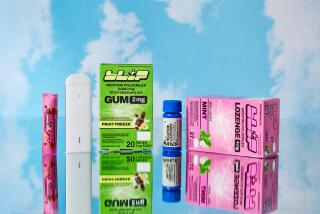Smokers Can Lick the Habit
- Share via
Here’s one candy you won’t be popping indiscriminately: lollipops laced with nicotine, the latest entry in the stop-smoking derby.
Independent pharmacists across the country are making these nicotine lollipops and selling them under brand names such as NicoStop, No Smoke, NicoPop and Likatine. Many of the pops are being sold over the Internet through druggists’ Web sites.
Most sites say a prescription is required, but critics fear that it is possible to buy the products online without a prescription or proof of age. “Nicotine is a strong and addictive drug, and should be used only under the supervision of a health professional,” says Carlo Michelotti, chief executive of the California Pharmacists Assn. in Sacramento. The nicotine-laced suckers, which sell for $2 to $3 each, have not been approved by the Food and Drug Administration and it is still unclear whether the marketing of such products violates any federal laws. So far, the nicotine lollipops have avoided regulatory scrutiny because they’re made by compound pharmacists, licensed druggists who produce custom medications like old-time apothecaries. These pharmacists are allowed to make special formulations when doctors request them for their patients, say experts. However, marketing these products over the Internet crosses into a gray area of questionable legality.
But sales of the products--sold in flavors such as apricot, eggnog and tutti-frutti--are soaring, according to pharmacists. The pops are designed to take the edge off a person’s cravings for nicotine as they attempt to stop smoking.
Ads on the Internet claim the lollipops work better than patches or gum because they not only suppress tobacco withdrawal symptoms, but give people more control over dosages. Pharmacists selling the products also say that the pops help satisfy the hand-to-mouth oral fixation that’s part of the cigarette habit.
The suckers have drawn the attention of government officials. Brad Stone, an FDA spokesman in Rockville, Md., said the agency is looking into such issues as the safety of the products’ active ingredient, nicotine salicylate. He also notes that, unlike stop-smoking gum or skin patches, the lollipop formulations have not undergone rigorous safety testing.
Rep. Henry A. Waxman (D-Los Angeles) sent a letter last Wednesday to Health and Human Services Secretary Tommy G. Thompson asking that the lollipops be removed from the market until they’re proven effective. Another concern, said Phil Schiliro, Waxman’s chief of staff, is that the lollipops might appeal to children who might eat them inadvertently.
Still, pharmacists say they seem more effective than over-the-counter remedies, like the patch or nicotine gum. “We’ve had very positive results,” said Jeffrey Alan Barris, owner of Pacifica Pharmacy in Torrance, which has been selling the nicotine lollipops for about two years. He sells about 200 suckers a month and estimates that “70% to 80% of the people who use these lollipops stop smoking.” But, he cautions, “they should only be sold by prescription. They’re not candy.”
More to Read
Sign up for Essential California
The most important California stories and recommendations in your inbox every morning.
You may occasionally receive promotional content from the Los Angeles Times.













